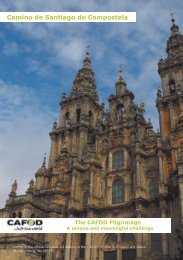Religious Education Curriculum Directory (3-19) - The Catholic ...
Religious Education Curriculum Directory (3-19) - The Catholic ...
Religious Education Curriculum Directory (3-19) - The Catholic ...
- No tags were found...
Create successful ePaper yourself
Turn your PDF publications into a flip-book with our unique Google optimized e-Paper software.
<strong>Catholic</strong> Bishops’ Conference of England and Wales — Department of <strong>Catholic</strong> <strong>Education</strong> and Formation<strong>The</strong> <strong>Religious</strong> Educator<strong>The</strong> Church recognises the fundamental contribution of those charged with the planning anddelivery of <strong>Religious</strong> <strong>Education</strong>. In what may be called the ‘hidden curriculum’, the witness,integrity and sincerity of the teacher or staff member will influence the communication ofChristian faith, especially as knowledge to be believed and lived. As Pope Benedict XVI has said:As you know, the task of a teacher is not simply to impart information or to provide training in skillsintended to deliver some economic benefit to society; education is not and must never be consideredas purely utilitarian. It is about forming the human person, equipping him or her to live life to thefull – in short it is about imparting wisdom. And true wisdom is inseparable from knowledge of theCreator, for ‘both we and our words are in his hand, as are all understanding and skill in crafts’ (Wis7:16). 15Developments in the provision of tertiary education and a greater variety of routes into the teachingprofession have led to changes in the formation and preparation of teachers. Indeed, many of ourteachers may not have been trained in the <strong>Catholic</strong> sector and may come from a variety of academicbackgrounds. <strong>The</strong> perennial challenge for the <strong>Catholic</strong> community is to identify the best ways inwhich to develop the character and knowledge of <strong>Catholic</strong> teachers. <strong>The</strong> <strong>Catholic</strong> Certificate of <strong>Religious</strong>Studies remains a significant element in the formation of our teachers and we hope that many morewill undertake this and other courses. This concern with formation is not limited to teachers of <strong>Religious</strong><strong>Education</strong>, but extends to all <strong>Catholic</strong> teachers and indeed to Senior Leaders and Governorswith whom responsibility for <strong>Religious</strong> <strong>Education</strong> rests.Those responsible for <strong>Religious</strong> <strong>Education</strong> in our schools should:• be prepared to give living witness to what they teach;• recognise that they share in the teaching office of the Church exercised in the person of thelocal bishop and enshrined in the trust deed of the school;• fulfil their professional responsibilities with regard to all that develops and enhances the lifeof the <strong>Catholic</strong> school;• plan and teach schemes of work that are engaging and accessible so that all pupils mayprogress appropriately in their knowledge and understanding of the <strong>Catholic</strong> faith;• have high expectations of all their pupils;• ensure that 10% of the curriculum to age 16 and 5% of the curriculum beyond the age of 16 isdevoted to <strong>Religious</strong> <strong>Education</strong>;• ensure that <strong>Religious</strong> <strong>Education</strong> contributes positively to the broad and balanced curriculumof a <strong>Catholic</strong> school through cooperation and dialogue with other subjects;• take care continually to deepen their own knowledge and understanding of the <strong>Catholic</strong> faith;• take seriously the duty of every <strong>Catholic</strong> to form his or her conscience;• be given opportunities for their own spiritual and professional development as <strong>Catholic</strong> educators.5
















